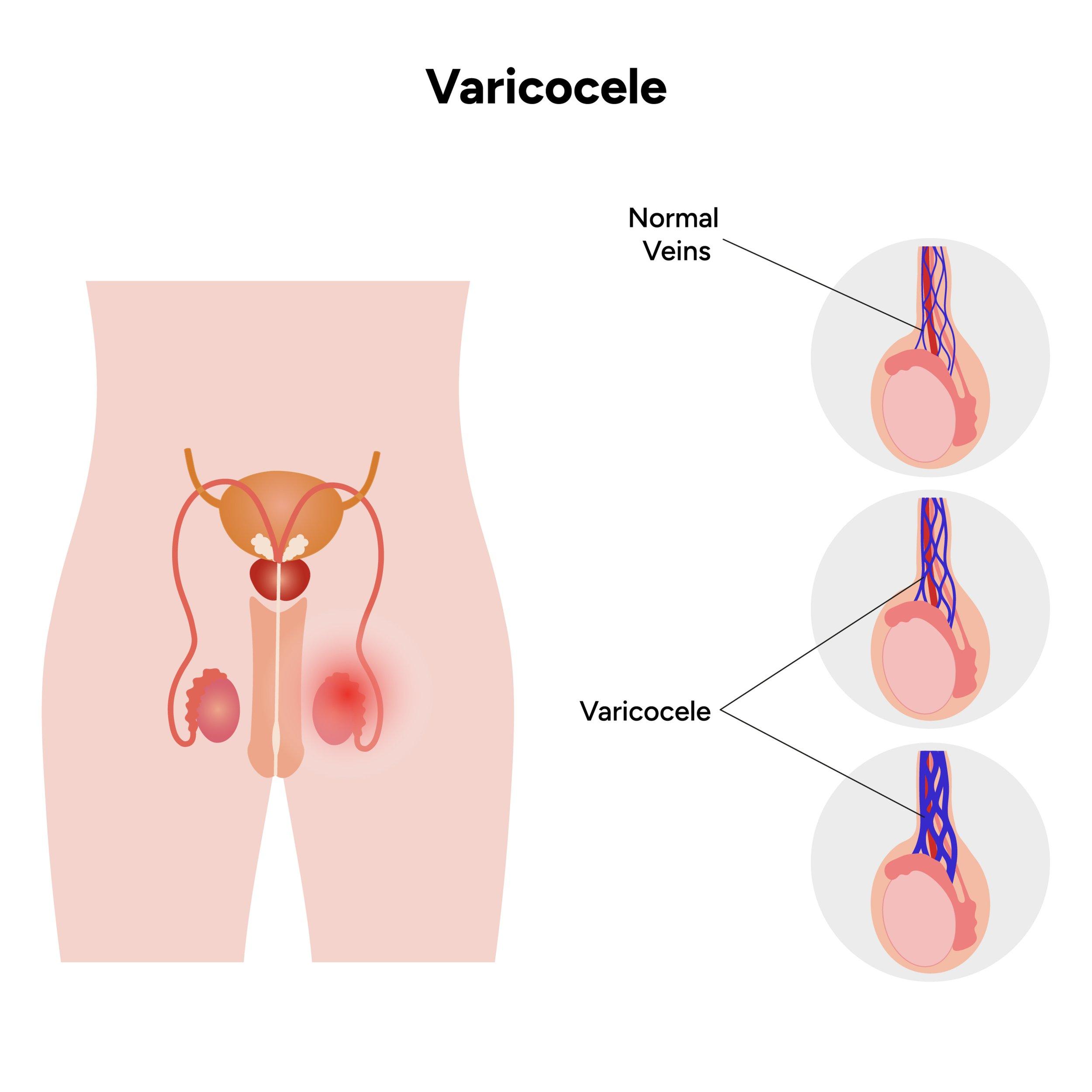Varicocele and Male Fertility: How It Affects Testicular Health

Introduction
Male reproductive health is vital for overall well-being, yet conditions like varicocele testicular problems often go unnoticed until they start affecting fertility or causing discomfort. Many men are unaware that one of the most common causes of male infertility is a condition called varicocele.
So, what is the connection between varicocele and male fertility, and how does it affect testicular health? In simple terms, a varicocele is the enlargement of veins in the scrotum that disrupts blood flow, increases scrotal temperature, and negatively impacts sperm production. This article explores everything you need to know about Varicocele and Male Fertility: How It Affects Testicular Health, including causes, symptoms, treatment options, lifestyle management, and recovery tips.
What Is a Varicocele?
A varicocele is an abnormal enlargement of the pampiniform plexus, a network of veins inside the scrotum. These veins play a key role in regulating the temperature of the testicles, which is essential for healthy sperm production.
When the vein valves fail, blood pools inside the scrotum, leading to:
-
Increased scrotal temperature
-
Reduced oxygen supply to testicular tissues
-
Disruption of sperm development and testosterone production
Varicoceles are common, affecting about 15% of all men and nearly 40% of men diagnosed with infertility.
How Varicocele Affects Testicular Health
1. Sperm Production and Quality
Healthy sperm require a cooler temperature than the body’s core. Varicocele increases scrotal heat, leading to:
-
Lower sperm count
-
Reduced sperm motility
-
Abnormal sperm shape
2. Testosterone Levels
The testicles are also responsible for testosterone production. Men with varicocele may experience lower testosterone levels, resulting in fatigue, mood swings, and reduced libido.
3. Testicular Atrophy
Varicocele can cause one testicle to shrink due to poor blood flow and tissue damage.
4. Infertility
The combined effect of sperm abnormalities and hormonal imbalance makes varicocele one of the leading contributors to male infertility.
Causes and Risk Factors of Varicocele
While the exact cause is not always clear, certain factors increase the risk:
-
Faulty valves in scrotal veins
-
Rapid puberty growth
-
Genetic predisposition (family history of varicose veins)
-
Increased abdominal pressure (obesity, heavy lifting, constipation)
-
Hormonal imbalances affecting blood vessel function
Common Symptoms of Varicocele
Not every man with varicocele experiences symptoms, but when they do appear, they include:
-
A dull or aching pain in the scrotum
-
Feeling of heaviness in the testicles
-
Enlarged veins resembling a “bag of worms”
-
Testicular shrinkage (atrophy)
-
Infertility issues despite regular attempts to conceive
Diagnosis of Varicocele Testicular Conditions
Doctors use several diagnostic tools to confirm varicocele:
-
Physical Examination – Checking for enlarged veins, especially while standing.
-
Valsalva Maneuver – Bearing down helps highlight abnormal swelling.
-
Ultrasound – Provides accurate imaging of blood flow.
-
Semen Analysis – Evaluates sperm count, motility, and quality.
Varicocele and Male Fertility: The Scientific Connection
Studies show that men with varicocele have a higher chance of infertility due to:
-
Oxidative Stress – Blood pooling leads to free radical buildup that damages sperm DNA.
-
Increased Temperature – Heat negatively impacts sperm formation (spermatogenesis).
-
Hormonal Disruption – Lower testosterone reduces overall reproductive function.
-
Sperm DNA Fragmentation – Affects embryo development and increases miscarriage risk.
For couples struggling to conceive, addressing varicocele can significantly improve outcomes.
Treatment Options for Varicocele
1. Conservative Management
For men with mild symptoms:
-
Wearing supportive underwear
-
Avoiding heavy lifting and prolonged standing
-
Using pain relievers like ibuprofen
-
Cold compress for temporary relief
2. Surgical Treatments
Surgery is recommended when infertility, pain, or testicular shrinkage occurs.
-
Microsurgical Varicocelectomy – Gold standard with high success rates and minimal complications.
-
Open Surgery – Traditional approach to tie off faulty veins.
-
Laparoscopic Surgery – Minimally invasive with faster recovery.
3. Non-Surgical Options
-
Percutaneous Embolization – A catheter inserts coils or solutions to block faulty veins.
Recovery and Fertility Improvements
-
Most men resume light activities within a few days post-surgery.
-
Full recovery takes 1–2 weeks.
-
Fertility improvements may take 3–6 months as sperm production cycles normalize.
-
Studies show that varicocele repair improves pregnancy rates significantly in couples facing infertility.
Lifestyle Tips to Support Testicular Health
-
Balanced Diet – Include zinc, selenium, omega-3s, and antioxidants for sperm health.
-
Regular Exercise – Moderate workouts improve circulation, but avoid excessive heavy lifting.
-
Weight Management – Obesity increases abdominal pressure and worsens varicocele.
-
Quit Smoking & Limit Alcohol – Both negatively affect sperm DNA.
-
Reduce Stress – Chronic stress lowers testosterone and fertility.
Conclusion
The link between varicocele and male fertility is undeniable. This common yet often overlooked condition disrupts sperm production, lowers testosterone levels, and increases infertility risks. The good news is that early diagnosis, effective treatment options such as microsurgical varicocelectomy, and lifestyle adjustments can restore testicular function and improve fertility outcomes.
If you suspect a varicocele testicular problem, consult a specialist to discuss diagnosis and treatment options. Timely intervention can protect fertility, enhance quality of life, and safeguard long-term reproductive health.
Frequently Asked Questions (FAQ)
1. Can varicocele cause complete infertility?
Not always, but it significantly reduces fertility potential.
2. Does every varicocele need surgery?
No, only cases with pain, infertility, or testicular shrinkage require surgery.
3. How long after varicocele surgery can fertility improve?
Improvements are usually seen in 3–6 months.
4. Can varicocele come back after surgery?
Yes, recurrence is possible but rare with advanced microsurgical methods.
5. Does gym workout increase varicocele risk?
Yes, heavy lifting and abdominal strain may worsen or trigger varicocele symptoms.
6. Can lifestyle changes alone treat varicocele?
They can help manage symptoms but won’t cure the condition.
- Art
- Causes
- Crafts
- Dance
- Drinks
- Film
- Fitness
- Food
- Games
- Gardening
- Health
- Home
- Literature
- Music
- Networking
- Other
- Party
- Religion
- Shopping
- Sports
- Theater
- Wellness


